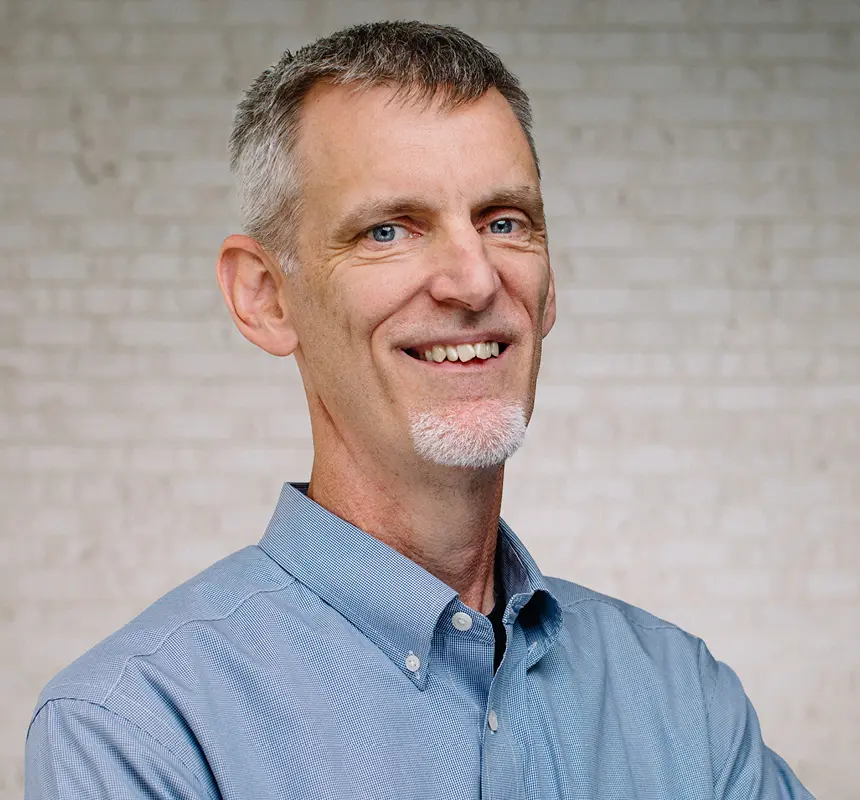by Jim Killam | 7-minute read
First Free Rockford offers a list of recommended marriage and family counselors. One of those is David Creek. In the first of two parts, Dave talks about spiritually healthy ways to deal with this high-pressure year.
I’m using the word “navigating” a lot right now for the holidays, for COVID, for the political stuff and everything else that’s on the radar. What are you seeing as a counselor? How are people doing?
I think that’s one of the most appropriate terms, because navigating makes me think of boating. It makes me think of coming upon a storm. Like anything, you can be faced with something that you are unprepared for. Nobody was really ready for this.
I said to a friend of mine who is a pastor, “This will be interesting because I think people are going to get faced with themselves in ways they haven’t been.” (For instance) the parent who has seen themselves and even been seen as, “I’m a really good parent. I’m patient, I’m good.” And COVID hits. They can’t go to work. They’re locked inside their house. And they find themselves being not that anymore. They’re quick to anger. Very frustrated, very distracted. What changed? It’s not that they weren’t patient. It’s looking at the context. Before, they had a break from parenting when they went to work. And then when they came home, they got to join into the parenting thing again.
But now they’re just immersed in it, and they are treading water that that they haven’t ever tread. It’s really unknown, just the aspect of being around their kids all day long. And then added onto that, if they’re still working, they’re trying to do remote work and they’re trying to navigate all the different aspects of what’s required or expected of them, both as an employee or an employer and as a spouse and as a parent. Their house is now that boat that’s on stormy water.
That can get overwhelming. What’s a good way to face it all?
People need a space to be able to unload. To vent. I think of it like a pressure cooker. There is a safety valve on top that will automatically release pressure. If it doesn’t, it has a really strong potential of blowing its lid.
I think in a lot of ways what this has done is, it’s caused people to be inside their own pressure cooker that they have not experienced before. So when I see people, we talk about what the pressures are. People need to be able to name what it is, and know that it’s OK to name it and to vent.
And then once you can expand that a bit, then you can start looking at what’s actually in the pot. Well, I’m frustrated because I feel like I’m failing as a parent. OK, let’s talk about why that is. What was it before that made you feel like you were a really good parent, and what is it about now? To be able to clearly look at it to see what’s going on.
Short of getting professional counseling, what does it look in regular, everyday life to be able to let off steam? Is it finding a friend or someone you can feel safe around?
I call those people trusted others. And they’re not always family members. I think of a trusted other as somebody who you can bare your soul or your experience with, in whatever glory or whatever ugliness it is – and the trusted other has the ability to hold that for you.
I had a friend when I worked in a missions organization. They would come into my office, and I knew something was up. The person would walk in, they’d quietly shut the door behind them, and just stand there. And when I would turn and look, sometimes they would unload. Sometimes the language got really colorful. And I would just sit there. Because I knew for this friend, they needed this moment to let this out.
As soon as they were done, they would walk over to the recliner that I had in my office. They’d sit down and put their head back, and I would ask, “Are you done?” And they would nod their head. And I would say, “Do you just need some time?” And they’d kick up their feet and I would go back to doing my work. They would sit there quietly – almost like they were taking a breath from what just occurred.
Sometimes that would lead to me saying, “Do you need to talk?” And they would be like, “Yeah, I need to figure this out.” Other times, they would say, “No, I’m good.” And I understood. For that person, this was a safe place for them to unload.
I think everybody needs those people who they can be completely vulnerable with, knowing that they are not going to get shamed.
Do you think a high percentage of people don’t have someone like that in their life?
Yes.
What could they do about that? It’s easy enough to say, “Go find somebody to talk to,” but if someone doesn’t know how, then that’s tough.
One, they need to name the people in their life that they would probably consider trusted others. But then they also can give each of those people kind of a value system. The way I describe this is, your life is a house. You’ve got a front porch, a yard, a fence. Outside of that fence you have a sidewalk. You’ve got people going up down the street. Most never pay attention to you. But some stop at the fence. And that’s a cordial conversation — “how’s the weather,” that kind of stuff.
Of the people who stop at the fence, there are those who you’ll open the gate to come play in the yard. When you’re playing with people, the conversation is a bit different. There’s a different kind of connection. Of the people in the yard, you will invite some of them up on the porch. You’ll sip sweet tea or something, and you will have a deeper conversation. And of the people on the porch, you will invite a few into your living room to sit on the couch, and you will share what’s most vulnerable.
Often people will say, “I don’t know who that is.” The reason I use those mental pictures is, I think people need to do the work of identifying who is where. So if you don’t know who would be sitting on the couch with you, then the question is, “OK, who’s on the porch?” Then it’s, “What would it look like for you to invite them into the living room?”
What does it look like?
It’s being the person who’s striking up a conversation and asking questions first. Like, with COVID: “I need to share with you, but for me to be able to do that, sometimes I need to invite you into the living room and I’m going to ask you the questions I really want you to ask me about. And so, I’m going to ask, how are things going in general? How are you doing with the lockdown? How are you doing with work? I know enough about you to know that you’re not going to the office. You’re at home. How are things going?”
The hope is that the other person would ask the reciprocal question. How are you? And then if they do, it’s “all right, I’m going to be authentic. I’m going to share exactly what this is.”
In my experience, it’s “Am I willing to go first?” You take a risk and extend trust.
I think sometimes it’s just naming what it is and what you’re hoping for, too. “You know what? This has been really hard for me. I feel like you and I have this relationship where I can share some things. Are you OK if I share that with you?”
Sometimes you need to test that first. It can even start with naming what you’re looking for. “Hey, I want to share some things with you, but I just want you to listen for right now. I don’t think I’m ready for questions just yet. I just need to get this off my chest. Is that OK?”
That way, you’re not setting an expectation for that person to fix you.
Yeah. I think naming those things can help release the tension even in that moment. Because then it allows the other person to have clarity around the expectations.
In Part 2: Specific ways to see God working in our current challenges.
—
David Creek grew up at First Free Rockford. During and after college he worked in youth ministry here, before working in a mission organization and then serving as a youth pastor for 15 years in Minnesota. He now is a licensed marriage and family therapist here in Rockford.





0 Comments